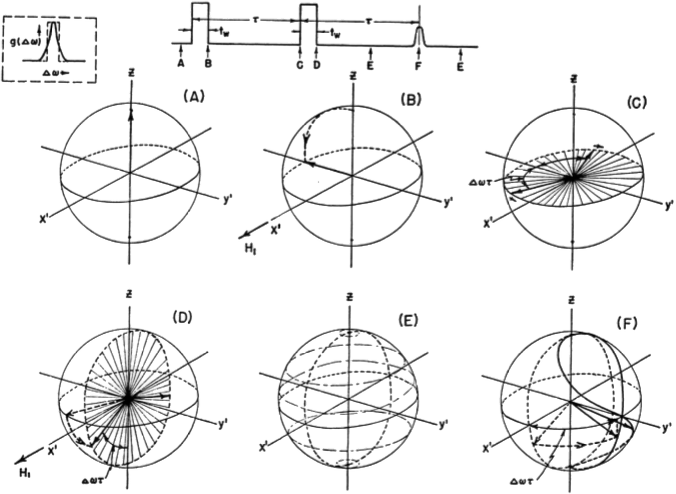Principles of Neuroimaging B - 2015
Principles of Neuroimaging B, Winter, 2015 - Class Schedule and Syllabus
Week 1 - MRI and fMRI
Monday 1/5/15
- MRI II Speaker: Cohen
Magnetic Resonance Imaging (MRI) is probably the most influential and most felxible current means of imaging the human brain. It features a vast number of separable contrast mechanisms, and a near ideal combination of non-invasiveness, safety, resolution and metric accuracy. However, it is extraordinarily expensive and has limited temporal resolution, especially for functional studies
OUTLINE Required Readings
- MRI Slides
- These notes by Joseph Hornak are highly professional and complete coverage of MRI.
- eMRI is another excellent online MRI learning resource
- Erwin Hahn - Spin Echoes: Essential reading for the MRI community
 above: Figure 1 from Hahn, 1950
above: Figure 1 from Hahn, 1950
Suggested Further Reading
Wednesday 1/7/15
- fMRI and MotionSpeaker: Cohen
Week 2 - Artifacts, Image Quality, Diffusion
Monday 1/1215
- Artifacts Speaker: Cohen
Wednesday 1/14/15
- Diffusion Physics Speaker: Ben Ellingson
Required Readings Slides should be up soon.
- Ben Ellingson Diffusion Slides uploaded 3/14/14
Suggested Further Reading
- Sadly, the library does not have a subscription for the journals below (Mark has copies on reserve in his office):
Week 3 - Swine flu and MRI
Monday 1/20/15
Class canceled due to flu. Sorry
Wednesday 1/22/15
Magnetic Resonance Imaging (MRI) is probably the most influential and most felxible current means of imaging the human brain. It features a vast number of separable contrast mechanisms, and a near ideal combination of non-invasiveness, safety, resolution and metric accuracy. However, it is extraordinarily expensive and has limited temporal resolution, especially for functional studies
OUTLINE Required Readings
- MRI Slides
- These notes by Joseph Hornak are highly professional and complete coverage of MRI.
- eMRI is another excellent online MRI learning resource
- Erwin Hahn - Spin Echoes: Essential reading for the MRI community
 above: Figure 1 from Hahn, 1950
above: Figure 1 from Hahn, 1950
Suggested Further Reading
Week 4 - Magnetic Resonance Imaging
Monday 1/27/1 - MRI
-MRI I Speaker: Cohen
Required Readings
Wednesday 1/29/15 - MRI II. Speaker: Cohen
Week 5 MRI and multimodal imaging
Monday 2/3/15
MRI (fMRI) III. Speaker: Cohen
Wednesday 2/5/15
Multimodal imaging. Speaker: Cohen
Week 6 Diffusion and PET
Monday 2/10/15
===Diffusion imaging.
Wednesday 2/12/15
Positron Emission Tomography. Speaker: Magnus Dahlboun
Handouts distributed in class.
Week 7
Monday 2/17/15 Presidents Day - No class
Wednesday 2/19/15
Week 8 Transcranial Magnetostimulation and PET applications
Monday 2/24/15
TMS. Speaker: Allan Wu
'Required Readings
Suggested Further Reading Once upon a time we demonstrated that this sort of magnetic stimulation can take place in the MRI machines:
Wednesday 2/26/1.
PET applications. Speaker: Edythe London
Week 9 - Spectroscopy
Monday 3/3/15 - Class canceled
Wednesday 3/5/15
Spectroscopy. Speaker: Albert Thomas
Handouts distributed in class
Week 10 - Compressed sensing and finals
Monday 3/10/15
Compressed Sensing. Speaker: Ming Yan
To access the slides from the course web site listed on his handout, The username is "caame654", and password is "dense".
Suggested Further Reading
- READING
- "An Introduction to Compressive Sampling" EJ Candes, MB Watkin, IEEE Signal Processing Magazine, March, 2008 <-- Mark's favorite. This is a good overview of the field.
- "Sparse MRI: The Application of Compressed Sensing for Rapid MR Imaging" M. Lustig, D. Donoho, J.M. Pauly, Magn. Reson. Med 58:1182–1195, 2007 Lustig demonstrates each step in the process with examples using MRI.
- "Compressed Sensing", D. Donoho, IEEE Trans. Inform. Theory 52:1289, 2006 One of the more accessible formal discussions of CS
- Rice University Compressed Sensing Resources. A repository of scholarly work on CS.